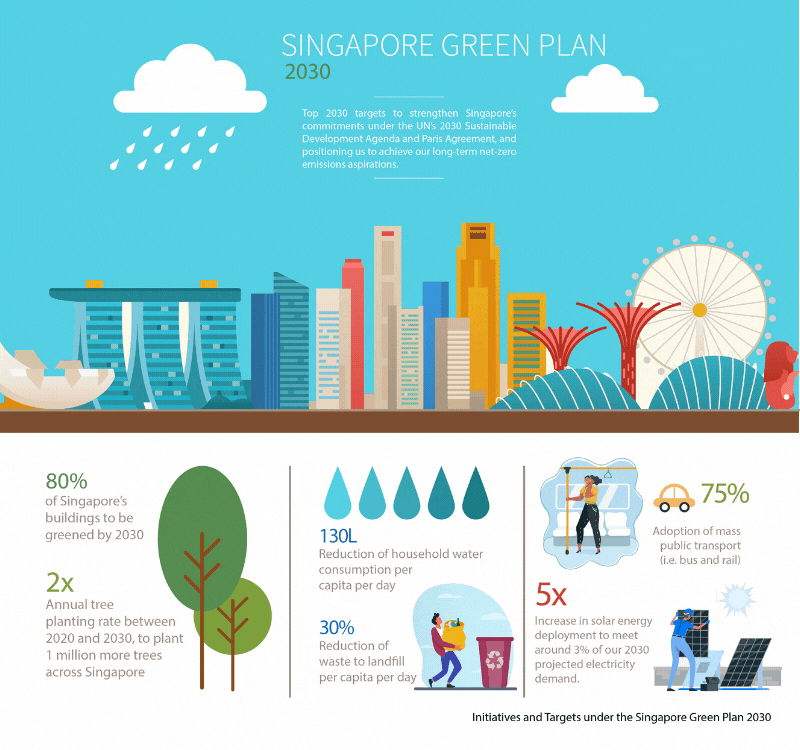4 takeaways from COP26 that will impact business in Asia
4 takeaways from COP26 that will impact business in Asia
By SMU City Perspectives team
Published
The United Nations 26th Annual Climate Change Conference COP26 wrapped up in November with the adoption of the Glasgow Climate Pact. Negotiated by over 200 countries, the new pact to reduce global warming reaffirms the Paris Agreement to keep temperature increases below 1.5 degrees Celsius, which translates into tougher national pollution policies across every sector, particularly those related to transportation and energy production.
This is a significant development for businesses in Asia as it puts pressure on organisations to follow through on net-zero strategies. For example, the pact stipulates that 40 per cent of global coal-fired power plants have to be shut down by 2030 — with India insisting on changing the phrase to “phase out” coal-fired energy generation to “phase down”. This development is nevertheless a breakthrough as efforts at previous conferences to commit to ending the use of coal have always faced strong opposition from coal-producing nations and countries that are highly dependent on fossil fuels.
The private sector will therefore play an increasingly vital role in climate change efforts, and have to stay one step ahead in order to ensure that their businesses can transition to a new economic model that aligns with sustainable development. Business leaders will take on the added responsibility of not just ensuring maximum profits, but also steering organisations towards long-term resilience by integrating climate considerations into their plans for development.
In 2021, Climate Governance Singapore (CGS) was established to raise the awareness of boards of directors to the impact of climate change, embed climate considerations into board decisions and equip all board members with the expertise to navigate the risks and realise the opportunities arising from climate change. SMU has been appointed as its knowledge partner, and developed a knowledge hub to provide access to resources such as workshops, conferences and a dedicated library, where boards of directors can leverage the expertise of renowned experts in risk management, strategic, financial and human capital planning, remuneration, and legal and governance models.
Dr Rajiv Lall, Professorial Research Fellow, SMU Sim Kee Boon Institute for Financial Economics, and the main lead for CGS-SMU Knowledge Hub, weighs in on how the Glasgow Climate Pact affects doing business in Asia, and ways in which corporate leaders can embrace their new roles as stewards of sustainability:
1. Strengthened agenda to reach climate targets

Countries including Singapore have pledged to strengthen their respective climate targets. This will require Singapore to do more than already committed under the Green Plan 2030, a whole-of-nation movement to advance the national agenda on sustainable development. One of the targets under the Green Plan, for example, aims to quadruple solar energy deployment by five times that of today.
Moreover, Thailand has pledged to reach carbon neutrality in 2050, while Vietnam aims to take stronger measures to reduce greenhouse emissions to achieve net-zero emissions that same year.
With the pace of government activity likely to be accelerated to meet COP26 commitments, the business models of organisations in Asia will come under greater scrutiny for their climate impact. Businesses will have to closely consider their risk management and governance strategies so as to meet updated metrics and targets.
2. Eliminate the use of coal

Dr Lall explains that Singapore joined the Powering Past Coal Alliance of COP26 in the context of which it has pledged to eliminate the use of coal by 2050 in its electricity mix and to stop financing coal-based energy around the region. Currently, 95 per cent of Singapore electricity relies on natural gas, with coal accounting for only 1.2 per cent. But with an impending review of Singapore’s current targets, “we could expect a faster switch to forms of clean energy than originally planned” says Dr Lall.
However, in Asia, the use of coal remains widespread — with more than 90 per cent of the world’s coal plants that are being built found in the region. The coal pledge at COP26 will see countries like China end public financing for the building of new coal plants, and power, construction, and manufacturing firms will also have to consider cleaner alternatives to fuel their energy needs. Moreover, financial institutions have kickstarted efforts to spur the development of renewable energies, with Singapore bank DBS financing various solar, geothermal and wind energy plants in Asia.
3. Impact of ending deforestation on banks

Singapore has also signed pacts to stop deforestation, reaffirming its commitment to protecting nature in the city-state, as well as reduce methane emissions. Both moves will have implications for Singapore businesses including for banks’ financing activities in neighbouring countries, notes Dr Lall.
For example, researchers at COP26 have revealed that Chinese-, US- and Indonesian-based banks have invested billions in businesses linked to deforestation activity. The declaration to end deforestation was also signed by Indonesia and Vietnam, and will possibly urge financial institutions to put an end to financing companies that enable forest destruction. Banks will have to commit to putting stronger policies and checks in place to safeguard against investments linked to deforestation, while consumers will inadvertently put pressure on businesses they support to end deforestation in their supply chains.
4. New market for trading voluntary carbon credits

COP 26 led to a breakthrough agreement on international norms for carbon credits, with negotiators striking a deal on regulations governing the international trade of emission reduction units, adds Dr Lall. This is expected to provide a major boost to markets for carbon credit and should improve prospects for Singapore’s recent initiative to launch a market for the trading of voluntary carbon credits.
“More broadly, the Glasgow financial alliance for Net Zero (Gfanz) presents an important opportunity for Singapore,” says Dr Lall.
“Given that many of the key global financial institutions that have pledged — as part of Gfanz — their commitment to Net Zero have operations in Singapore, the prospects for positioning Singapore as a major gateway for green finance are looking brighter.”
Climate change is a significant and growing threat to the Asian economy, and the latest measures put forth by COP26 will motivate companies in the region to reassess their current strategies. Leaders of Asian businesses will therefore need to craft a new paradigm that prioritises environmental stewardship, as they respond to rising calls for action from stakeholders while mitigating climate-related risks to their operations in the long term.

